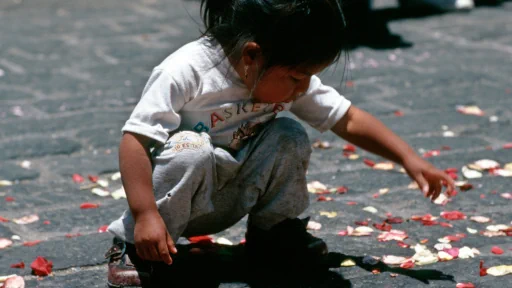Opinion Editorial Archive September, 2022: The Carnival Is Over

Twenty years ago, the carnival known as La Virgen de las Mercedes ended in the small Ecuadorian town of Latacunga. The indigenous Quichua child in this month's photo was having none of it. She wanted the carnival to continue.
During her grandparents' childhood, in 1965, "The Carnival Is Over" was the title of a popular folk song with some lyrics inspired by the Rio Carnival. Last month, that song took on a symbolic meaning when lead vocalist Judith Durham passed away.
The song's title also took on a figurative meaning last month. The Industrial Revolution was arguably the biggest turning point in human history. It has enabled life to be like a carnival for many. Economic output skyrocketed, standard of living increased and global population expanded exponentially. Taken together, many of last month's news stories tell us that this carnival is over.
Ecuador became the latest country to join the list of places where we are seeing the beginnings of the collapse of society. In the United States, visiting Hungarian Prime Minister Viktor Orban appeared to foretell the collapse of that society if it failed to heed the imminent clash of civilizations faced by the West. Ironically, he seems both unaware of the internal clash of ideologies already present in the US and intent on creating such a clash in his own country. There, also last month, his government fired two members of the National Meteorological Service for getting the weather forecast wrong.
Given the extreme climate events we continue to see around the world, we might wonder whether meteorologists will soon face worse threats than just losing their job. While that may sound far-fetched, it happened in the United Kingdom last month following record high temperatures there. In countries like Colombia, Mexico and Brazil it has become almost normal to murder journalists who tell the truth.
Brazil will hold elections next month but the internal clash it faces was already on display last month. Presidential frontrunner Lula da Silva claimed he could expand Brazil's agribusiness without further Amazonian deforestation. (But then he also promised he would end illegal activities in the Amazon and stamp out corruption in the whole of Brazil — which we all know is impossible.) In contrast, Henrique Oliveira, who is a gubernatorial candidate for Amazonas State, wants to build casinos on indigenous Amazonian land. Perhaps the most fortunate person in the whole region last month was the "indigenous man of the hole" who died having fulfilled his lifelong wish — to have no contact whatsoever with the outside world. Perhaps the only saving grace about Brazil's elections is that a record number of candidates will be indigenous.
It should come as no surprise that the carnival is over; indigenous people have been warning us for decades. What is surprising is how long it has taken us to realize it: The global economy and the global climate have been intricately interconnected since the carnival began. How we will be impacted was foreshadowed last month when a symbolic funeral was held in Buenos Aires for the death of the living wage. How we will fail to adapt was foreshadowed last month when the global community failed in New York to pass the UN High Seas Treaty to protect our oceans. How we will be forced eventually to adapt was foreshadowed by the recipients of the Equator Prize last month. They are already using indigenous knowledge to get a head start in the new survival game.
If you enjoyed reading this month's opinion editorial, please consider supporting independent, advertising-free journalism by buying us a coffee to help us cover the cost of hosting our web site. Please click on the link or scan the QR code. Thanks!

